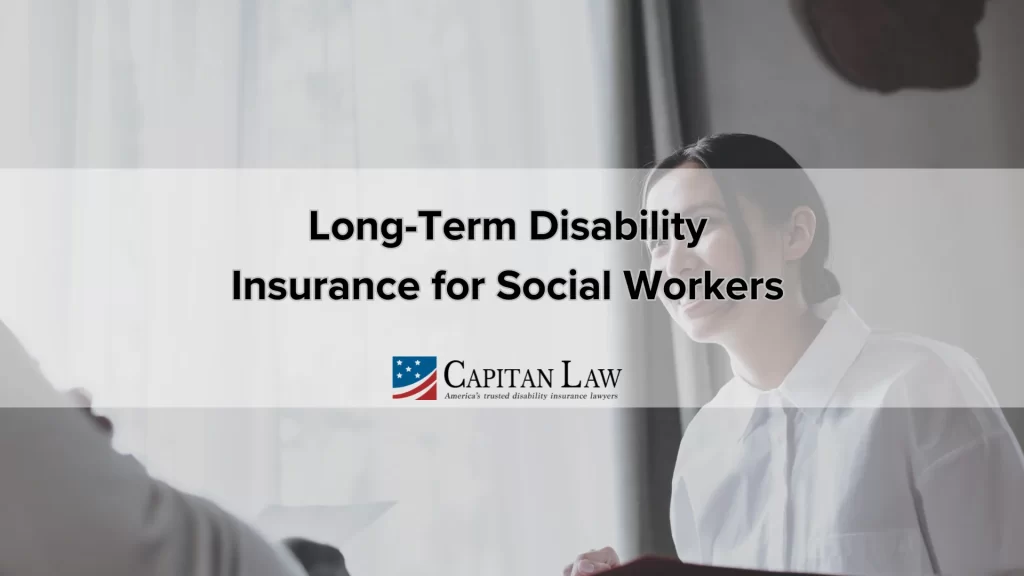
Long-Term Disability Insurance for Social Workers
As a social worker, you are responsible for working with children and families during various daily struggles, including incidents of neglect, abuse, and domestic violence. Families depend on you to support them through challenging times and provide the compassion and guidance necessary to cope.
Your occupational duties and obligations can be taxing and could cause you to develop significant emotional and psychological issues. Social workers can suffer from anxiety, depression, and other mental illnesses. Physical injuries and ailments can interfere with job performance.
At Capitan Law, our team understands a social worker’s job, physical stress, and emotional burden. When you can’t return to work, you can’t earn the income you need to support yourself. Call the social worker long-term disability attorneys of Capitan Law at (267) 419-7888 for a free consultation to determine your eligibility for long-term disability benefits.
Common Medical Conditions Related to Social Work
Social workers can spend hours sitting in front of a computer when they’re not in the field. Staring at a computer screen, typing on a keyboard, and extended sitting can lead to various health problems.
Social workers are on their feet on busy days, visiting families and protecting them from domestic issues. Stress can trigger injuries and manifest as physical pain and other symptoms, making it difficult to do the job without discomfort.
Common work-related medical conditions and injuries social workers sustain include:
- Eyestrain and vision loss
- Arthritis
- Mental illness
- Chronic pain, exhaustion, and soreness
- Back and neck pain
Long-term disability insurance is available regardless of what caused your injury or illness. If your condition prevents you from earning your usual wages, you should be able to collect disability benefits through your employer. You should also qualify for long-term disability even if you are an independent contractor who performs social work services for agencies or groups.
 Understanding Long-Term Disability Insurance Policies as a Social Worker
Understanding Long-Term Disability Insurance Policies as a Social Worker
The definition of disability is crucial in a long-term disability insurance policy. An “own occupation” definition is the most beneficial for social workers. The two most common types of own occupation are true own occupation and modified own occupation.
True Own Occupation Disability Policy
With a true own-occupation disability policy, the benefits you receive will depend on your inability to return to your job as a social worker and whether you can work elsewhere to earn an income. That means you can seek employment in another occupation while collecting disability benefits for the job you can no longer do.
Modified Own Occupation Disability Policy
A modified own occupation disability policy is different. Your long-term disability benefits will depend on whether you can continue working as a social worker due to your medical condition. However, you’re not allowed to take another job while collecting benefits.
Any Occupation Disability Policy
The “any occupation” disability definition is often problematic for social workers seeking disability benefits. With any occupation policy, you’ll be unable to collect benefits if you can maintain gainful employment in any job based on your training, education, and experience. The insurance company will likely deny your claim if you earn income in any occupation.
Why Long-Term Disability Insurers Deny Disability Benefit Claims
You must meet strict requirements to collect disability benefits as a social worker. Making a mistake on your application, missing a deadline, or submitting incomplete medical records can result in denial.
The most common reasons for denied disability claims include:
- Insufficient medical evidence to support the injury or illness
- The injury is a pre-existing condition or is not considered a disability under the policy’s definition of a disability
- Missing the deadline to file the claim
- Providing incomplete or inaccurate documentation
- Failing to follow the treatment plan necessary to treat the injury or illness
- Missing information on the claim form
Appealing a Denied Disability Claim
Receiving a denial letter after filing a claim for long-term disability benefits doesn’t mean you’re out of options. You can file an appeal to get the insurance carrier’s decision reversed.
The first thing you must do is understand why the insurer denied your claim in the first place. The denial letter should include an explanation.
Sometimes, the solution is simple. You might have submitted incomplete medical records. That would require you to provide the insurance company with the missing documents to establish an injury or illness that prevents you from earning your regular income.
Once you determine the reason for the denial, gather the necessary documentation to include with your appeal. You can obtain written letters from your doctors describing the nature of your medical condition and how it limits your physical or mental functioning. Medical evidence is essential in disability claims. It can help prove your inability to work.
Statements from experts are also beneficial in a long-term disability appeal. Written observations and opinions from medical experts specializing in your condition can strengthen your case. Vocational experts are also crucial. They can explain the effects of a disability on a person’s job and whether seeking other employment is possible.
You might need additional testing to support your eligibility for benefits. Diagnostic tests can further demonstrate your medical condition and how it affects your faculties. For example, part of social work requires typing on a computer. If you have carpal tunnel syndrome, a wrist ultrasound can show the condition of your nerves and bones.
If your appeal is unsuccessful and the insurer still denies your claim for benefits, you can file a lawsuit. However, pursuing legal action against an insurance company is challenging. You should consider hiring an experienced long-term disability insurance attorney.
Fight for the Long-Term Disability Benefits You Deserve
Your job as a social worker is meaningful and makes a difference in others’ lives. When you can no longer do your job, you require disability benefits to support yourself and be able to afford your medical treatment. You might feel hopeless if the insurance company denies your claim, but you can fight back.
The long-term disability attorneys of Capitan Law are ready to represent you whether you’re filing an initial long-term disability insurance claim or appealing a denied claim. We will protect your rights and aggressively pursue a favorable outcome for you.
Call us at (267) 419-7888 today for a free consultation to get started. With offices in Kentucky and Pennsylvania, we can help injured social workers there and also in New Jersey.
Related Posts:
 Understanding Long-Term Disability Insurance Policies as a Social Worker
Understanding Long-Term Disability Insurance Policies as a Social Worker